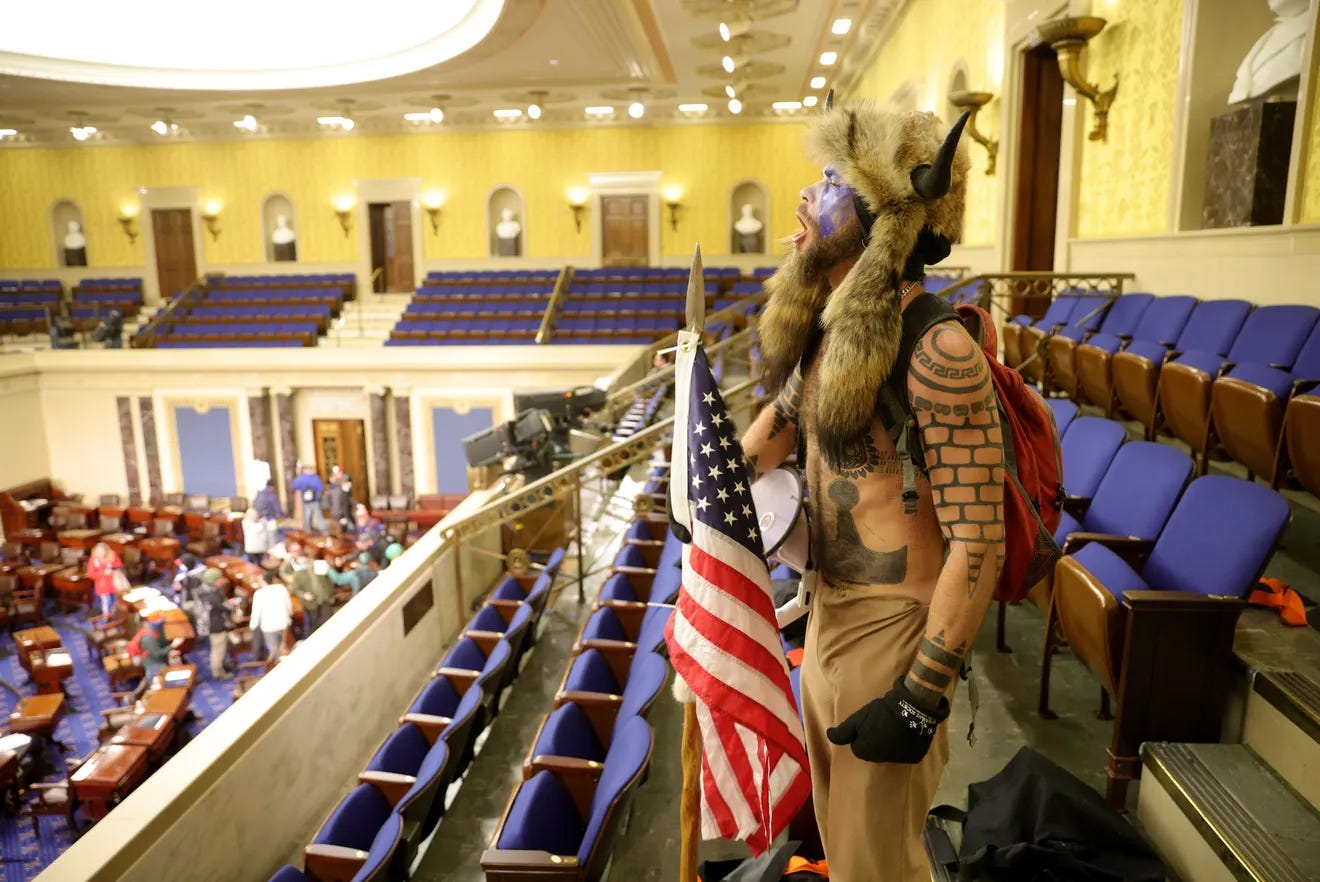Andrew Yang and The American Spirit
On ex-gothery, shaman chic, and the conservative case for self-help
I voted for Andrew Yang for NYC mayor and was sorely disappointed he didn’t win. In the days before the election, I stopped on the street in my neighborhood to talk to various campaign volunteers who were handing out flyers for candidates. It was thrilling to speak to fellow Americans about their beliefs and principles, and I was struck by the civility of those conversations. On one afternoon I chatted with a progressive who stood only three feet from a member of the Police Benevolent Association. Both were respectful and considerate. In the end, Chinatown (where I live) voted overwhelmingly for Yang. Citywide, he got trounced.
People have been chattering about the possibility of a third party for a long time, and enthusiasm has only grown over the past few months. In my lifetime, third parties have been considered fringe or only for freaks (Libertarian, Green). But I see increasing hunger for a viable, major alternative— for those of us who are disaffected moderates, IDW sympathizers, futuristic conservatives, anti-idpol Democrats, neither Trumplicans nor CRT stans. Are we a greater majority than we realize? And is it no longer enough to simply be an independent? More precisely, is Andrew Yang’s Forward party the answer we have been looking for?
Yang was predictably lambasted for appearing on Tucker Carlson. But I admire him for being willing to speak to his fellow Americans, as I had the opportunity to do that week of the election. After all, Carlson’s show is one of the most highly rated programs in the country. People are tired of the sanctimonious accusation that to speak to an ideological opponent is to “platform” an unmentionable. I, for one, have been pleasantly surprised by the geniality and openness of those Republicans I have started talking to, after a lifetime of being told they were evil.
A lesser known fact is that Yang had a goth phase. It is typical of goths to be innovative and to favor solutions outside of traditional thinking. To be goth is to engage in a kind of refusal. It is to set oneself apart from what is established and taken for granted. Perhaps it is this element in Yang that allows him the bravery to reify the significant TPE (Third Party Energy) that is rising. One of the leftist critiques during his mayoral run was that he was essentially a Republican, or a libertarian— that he wasn’t a “real” Democrat. Not only do I think this is true, I think it’s a compliment. I have long thought that Yang could represent a vision of a kind of modern conservative. He merges an entrepreneurial mentality— essential to the American spirit— with a shame-free, futuristic conception of welfare (UBI). He’s a “make your bed” type (“I grew up in a household that prioritized good grades and keeping my room clean. My family never spoke about politics.”) He has family values and is reported to have attended a Christian church in New Paltz. He is refreshingly free of the racial rhetoric that characterizes the Democrat party, and of any kind of victim mentality. His own willingness to launch a political party after two major electoral defeats shows his innate drive and radical persistence.
Yang has waffled on inflammatory issues such as abortion and Israel, at times seeming to paper over his right-of-center initial statements with an “I can please everyone” congeniality, which makes people suspicious. His current stances on vaccine passports and mandates are unclear— and I’m sure that I’m more libertarian than he is in that regard. Still, he is an essential American figure for our time, a persona that communicates hope and optimism in a time of apocalyptic feeling.
In George Packer’s excellent “Last Best Hope: America in Crisis and Renewal,” a taste of which appeared in The Atlantic this summer, he outlines how the country split into four parts: Free America, Smart America, Real America, and Just America. Real America is characterized as largely white, rural, Christian, and working class. It’s an interesting distinction; one could and should claim that all parts of America— from the hay bales of the Great Plains to the Brooklyn streets where Christopher Wallace wrote his first verses as the Notorious B.I.G.— are Real America. This perception of the country would be consistent with a revelatory therapeutic method invented by Richard Schwartz called Internal Family Systems. In IFS, there are “no bad parts”— every faction of a person’s psyche is legitimized and considered integral. No aspect of identity is rejected.
In describing Real America, Packer spills extensive ink on Sarah Palin and his antipathy is clear. No educated, respectable liberal can express admiration for Palin without eliciting gaping jaws, but there is absolutely a quality of character in the former VP candidate that is being suppressed in America’s current conception of self. And it is a quality that is essential to our survival.
Palin had gumption. She was, as Camille Paglia wrote in 2008, a “tough, scrappy fighter,” “able to to seem simultaneously reassuringly traditional and gung-ho futurist,” a “gun-toting” figure like “Annie Oakley, a brash ambassador from America's pioneer past,” a kind of “can-do, no-excuses, moose-hunting” frontier feminist— “a world away from the whining, sniping, wearily ironic mode of the establishment.” One could make similar claims of Yang. If Oakley’s frontier was the West, Yang’s is the discord that has grown among Americans.
This capable attitude exists most commonly in working class and immigrant populations. It is not prevalent in the chattering or clerical classes. People who work with their hands do not have the time or inclination to moan about the apocalypse. And those who are in power would do well to listen to them.
Bridget Phetasy is one such working class voice. A podcaster and comedian who often speaks about being both politically homeless and in recovery from drugs and alcohol, she hosts eminent intellectuals in a way that is refreshingly free of academic jargon. She espouses qualities of grit, resilience, and genuine healing without succumbing to bland therapeutic tropes or fashionable grievance. Most notably, she often talks about how being in recovery led her to question whether she was conservative after a lifetime of pure-blue liberalism (what she has called her “factory settings”). It’s not surprising. Both conservative values and recovery literature urge one to never be a victim and to grow a sense of self-trust— perhaps even an Emersonian self-reliance.
There is a conservative case to be made for self-help. The concept is most commonly associated with gooey Oprahisms and candles that smell like vaginas, but right-of-center people talk about self-improvement in an entirely different way (see Megyn Kelly’s recent conversation with Ryan Holiday about the Stoic response to anxiety). To help oneself can be a libertarian act, a DIYism, a punk move that is positive.
Much has been made of the animal pelts, horns, and bizarre bare-chested aesthetic of the rioters who stormed the Capitol. It feels forbidden to even analyze, but one does not have to endorse their attack on the government in order to examine the visual cues. To be sure, these men were serving lewks with a message. The assorted images and symbols associated with far-right and racist groups, which other writers have explored, should send a chill up the spine of any American who values equality and decency. But there are other elements present in these outfits that signal something repressed in our national mythology that needs to be redeemed. A connection to the natural. An orientation toward the holistic. A risk-taking anti-safetyism. A kind of savage, pioneer spirit. These are qualities that have no place in, and are actively reviled by, the professional and educated classes of this country. And if they are allowed to be claimed by only far-right elements, we are in danger indeed.
QAnon should be read and understood as one might try to interpret a nightmare. Its theories should not be taken literally, but regarded as metaphor, or an allegory. A dream about leaving the house without pants, for example, may signal embarrassment in waking life. It is not true that Democrats are running an underground cabal of Satanic, pedophiliac cannibals, but I do believe many working class parents are concerned that schools are corrupting their children with ideologies that go against their values. The fact that they are not allowed to discuss this without condemnation or being called names results in a kind of fantastical pathology.
The point I am trying to make is that we repress essential elements of the American character at our peril. When the credentialed, moneyed classes are consumed with safety at all costs and the stifling of raw expression, our ideals of enterprise, risk, and liberty will incarnate in unhealthy ways. That is why we need great Americans— like Yang— to embody them without fear. There are no bad parts. And we need to start talking to each other.








